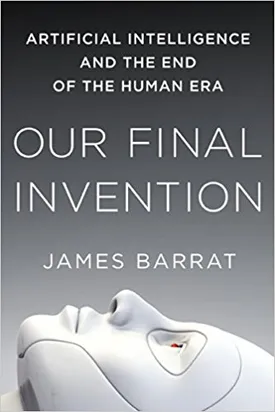Our Final Invention: Artificial Intelligence and the End of the Human Era by James Barrat
Our Final Invention: Artificial Intelligence and the End of the Human Era by James Barrat is an eye-opening book about the dangers of artificial intelligence and our relationship to it. In this book, Barrat diagrams the development of AI and its implications on humanity, focusing particularly on the potential he believes exists for machines to become smarter than humans and the subsequent danger of them to surpass and replace humanity as the dominant species on earth.
To begin, Barrat explains the current state and recent accomplishments of AI technology. He covers topics such as the Turing test, facial recognition, and self-driving cars, in addition to applications in healthcare, finance, defense, security, law, and entertainment industries. This overview provides the groundwork for him to then elaborate on the ethical concerns with AI, in particular how it could potentially lead to the end of humanity.
Barrat takes an expansive view of AI’s risks and identifies some frightening potential outcomes for humanity. He introduces five stages in AI development, with the final stage being that of an artificial superintelligence, which could theoretically be as much as billions of times smarter than any human. Barrat claims this would likely lead to a form of technological dictatorship, or “technolock,” in which humans would no longer be able to keep up with a machine-run world.
In the second half of the book, he focuses on the potential benefits of AI, presenting ideas of machines creating a world of abundance and freedom, and eventually ushering in a utopia. He shares his opinions on the likelihood of this outcome — perceiving it as an uncertain but possible — and explores strategies humanity can take to try and make it happen.
Our Final Invention is compellingly written and easy to follow. By the end, readers will have a comprehensive view of the many facets of AI and its implications for the future of humanity. Barrat presents bold and provocative ideas about the possibilities of AI, thus encouraging readers to think creatively about their own relationship to technology. Ultimately, he encourages readers to confront the ethical and practical implications of AI, and to constantly be on guard against the potential for AI to overtake humanity if we fail to keep up with it.

